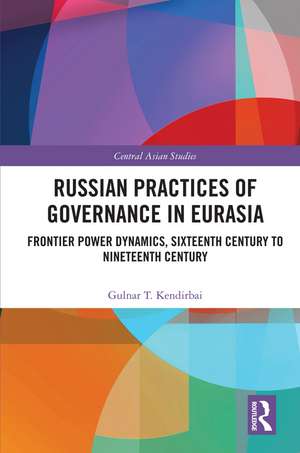Russian Practices of Governance in Eurasia: Frontier Power Dynamics, Sixteenth Century to Nineteenth Century: Central Asian Studies
Autor Gulnar T. Kendirbaien Limba Engleză Hardback – 26 feb 2020
Demonstrating that the mobility factor strongly shaped the system of protectorate that the Russian and Qing monarchs imposed on their nomadic counterparts, the book argues that it operated as a flexible institutional framework, which enabled all sides to derive maximum benefits from a given political situation. The author establishes that interactions of Russian authorities with their Kalmyk and Qazaq counterparts during the mid-16th to the mid-19th centuries were strongly informed by the power dynamics of the Inner Asian frontier. These dynamics were marked by Russia’s rivalry with Qing Chinese and Jungar leaders to exert its influence over frontier nomadic populations. This book shows that each of these parties began to adopt key elements of existing steppe political culture. It also suggests that the different norms of governance adopted by the Russian state continued to shape its elite politics well into the 1820s and beyond. The author proposes that, by combining key elements of this culture with new practices, Russian authorities proved capable of creating innovative forms of governance that ended up shaping the very nature of the colonial Russian state itself.
An important contribution to the ongoing debates pertaining to the nature of the spread of Russian rule over the numerous populations of the vast Eurasian terrains, this book will be of interest to academics working on Russian history, Central Asian/Eurasian history and political and cultural history.
| Toate formatele și edițiile | Preț | Express |
|---|---|---|
| Paperback (1) | 258.14 lei 6-8 săpt. | |
| Taylor & Francis – 29 aug 2022 | 258.14 lei 6-8 săpt. | |
| Hardback (1) | 764.20 lei 6-8 săpt. | |
| Taylor & Francis – 26 feb 2020 | 764.20 lei 6-8 săpt. |
Din seria Central Asian Studies
-
 Preț: 371.71 lei
Preț: 371.71 lei -
 Preț: 326.49 lei
Preț: 326.49 lei -
 Preț: 340.37 lei
Preț: 340.37 lei -
 Preț: 386.05 lei
Preț: 386.05 lei - 18%
 Preț: 1170.84 lei
Preț: 1170.84 lei - 12%
 Preț: 299.52 lei
Preț: 299.52 lei -
 Preț: 407.52 lei
Preț: 407.52 lei - 18%
 Preț: 1057.75 lei
Preț: 1057.75 lei - 26%
 Preț: 822.01 lei
Preț: 822.01 lei - 18%
 Preț: 1109.18 lei
Preț: 1109.18 lei - 13%
 Preț: 297.57 lei
Preț: 297.57 lei - 18%
 Preț: 1058.79 lei
Preț: 1058.79 lei - 12%
 Preț: 312.77 lei
Preț: 312.77 lei - 12%
 Preț: 299.52 lei
Preț: 299.52 lei - 19%
 Preț: 702.06 lei
Preț: 702.06 lei - 18%
 Preț: 1056.35 lei
Preț: 1056.35 lei - 18%
 Preț: 727.19 lei
Preț: 727.19 lei - 16%
 Preț: 260.93 lei
Preț: 260.93 lei - 18%
 Preț: 1218.34 lei
Preț: 1218.34 lei -
 Preț: 413.98 lei
Preț: 413.98 lei - 22%
 Preț: 322.79 lei
Preț: 322.79 lei - 13%
 Preț: 309.69 lei
Preț: 309.69 lei -
 Preț: 420.08 lei
Preț: 420.08 lei -
 Preț: 416.22 lei
Preț: 416.22 lei - 18%
 Preț: 1053.16 lei
Preț: 1053.16 lei - 18%
 Preț: 1050.61 lei
Preț: 1050.61 lei -
 Preț: 436.14 lei
Preț: 436.14 lei - 18%
 Preț: 1057.05 lei
Preț: 1057.05 lei - 18%
 Preț: 1060.87 lei
Preț: 1060.87 lei - 26%
 Preț: 763.23 lei
Preț: 763.23 lei -
 Preț: 488.71 lei
Preț: 488.71 lei - 18%
 Preț: 1328.55 lei
Preț: 1328.55 lei - 18%
 Preț: 1109.18 lei
Preț: 1109.18 lei - 18%
 Preț: 1057.05 lei
Preț: 1057.05 lei - 25%
 Preț: 770.09 lei
Preț: 770.09 lei
Preț: 764.20 lei
Preț vechi: 1027.40 lei
-26% Nou
Puncte Express: 1146
Preț estimativ în valută:
146.27€ • 150.74$ • 123.49£
146.27€ • 150.74$ • 123.49£
Carte tipărită la comandă
Livrare economică 03-17 martie
Preluare comenzi: 021 569.72.76
Specificații
ISBN-13: 9780367196752
ISBN-10: 0367196751
Pagini: 246
Ilustrații: 40
Dimensiuni: 156 x 234 x 16 mm
Greutate: 0.45 kg
Ediția:1
Editura: Taylor & Francis
Colecția Routledge
Seria Central Asian Studies
Locul publicării:Oxford, United Kingdom
ISBN-10: 0367196751
Pagini: 246
Ilustrații: 40
Dimensiuni: 156 x 234 x 16 mm
Greutate: 0.45 kg
Ediția:1
Editura: Taylor & Francis
Colecția Routledge
Seria Central Asian Studies
Locul publicării:Oxford, United Kingdom
Public țintă
PostgraduateCuprins
Introduction Part One: The Russian Institution of Protectorate 1. Patterns of Power and Authority 2. The Russian Politics of Ulus Part Two: Kalmyk-Russian Protectorate Relations 3. Uneasy Encounters 4. From Patronage to Protection (Protektsiia) Part Three: Placing the Qazaqs Under Russia’s Protection 5. The Qazaq Junior Horde and Russia 6. The New Jungar Offensive and Its Impact 7. From Protection to Confirmation (Konfirmatsiia) Part Four: Between Russia and the Qing 8. After the Fall of the Jungars 9. The Qazaq Oath Taking Ceremony Part Five: Staying on the Imperial Fringe 10. The Establishment of the Bokei Horde 11. The Politics of Qazaq Deputations Conclusion
Notă biografică
Gulnar T. Kendirbai is Adjunct Assistant Professor of History at Columbia University, USA.
Recenzii
This book examines the Russian Empire’s relationship with the nomadic Kalmyk and Qazaq (Kazakh) peoples of the steppe, from the expansion of the Russian frontier into these lands in the 16th century until the eve of the Russian conquest of much of Central Asia in the mid-19th century. [...] The treatment is heavy on detail, but that detail makes this book a useful reference. Summing Up: Recommended. Graduate students and faculty.
M. A. Soderstrom, Aurora University, USA. CHOICE May 2021 Vol. 58 No. 9.
M. A. Soderstrom, Aurora University, USA. CHOICE May 2021 Vol. 58 No. 9.
Descriere
This book analyses the role of the mobility factor in the spread of Russian rule in Eurasia in the formative period of the rise of the Russian Empire and offers an examination of the interaction of Russian authorities with their nomadic partners.
